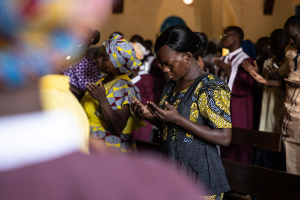Revelation 6: The rider death on a corpse-colored horse, with Hell following after him

Recorded in the book of Exodus is the true story of how God judged Egypt and set the Hebrews free from slavery. God sent disaster and pestilence.
The land was plagued with frogs, gnats and flies. The livestock died of disease. Egyptians were covered with boils. A hailstorm killed people and animals, as well as destroyed their crops. Swarming locusts destroyed all the vegetation throughout the land. Darkness was sent so thick the people said they could feel it.
Finally came the death of every firstborn son in Egypt. With each terrible catastrophe, Pharoah was allowed several opportunities to acknowledge God and repent. However, the Bible says he hardened his heart and spurned each chance he was given.
Melody Rossi, in May I Walk You Home? has written:
“It is heartbreaking to watch someone we love suffer from illness. Sometimes it raises difficult questions for us and can even make us feel angry with, or abandoned by, God. Though we can’t always know why he chooses a certain path for us, we can trust him based on what we know of his character. If the situation seems unbearable, [we should] reflect on what these hardships are purchasing … No matter how deep the suffering, the cost is nothing compared to the joy that will be experienced if your loved ones come to know Jesus through this ordeal.”
In Revelation chapter 6, the apostle John is permitted to see how God intends to wrap up human history. The apostle has seen Christ given a scroll with seven seals, the title deed to the earth. Each seal broken on the scroll reveals an action God plans to take.
When the first seal was broken, John saw a rider on a white horse representing a great world leader who would deceive the nations. When the second seal was broken, John saw a rider on a red horse who was given the power to take peace from the earth. When the third seal was broken, John saw a black horse rider carrying a pair of scales, bringing great famine. When the fourth seal was broken, this is what John said he witnessed:
“When the Lamb broke the fourth seal, I heard the fourth living being say, ‘Come!’ I looked up and saw a horse whose color was pale green. Its rider was named Death, and his companion was the Grave. These two were given authority over one-fourth of the earth, to kill with the sword and famine and disease and wild animals” (Revelation 6:7-8).
This rider is on a pale, or what might be deemed a “livid,” greenish horse — a horse the same color as a corpse. Its rider is named “Death,” and “Hell” or the “Grave” follows him. Behind Death, the Grave acts like a street sweeper that follows behind the carnage, sweeping masses of souls who have died without knowing Christ into the pit of Hell.
The rider on the corpse-colored horse rides throughout the earth and destroys one-fourth of the world’s population with war, famine, pestilence (disease), and wild beasts. This event is more significant and intense than anything this world has ever experienced. Millions, even billions, will die from disaster and disease.
Interestingly, when the late Dr. H.A. Ironside wrote his classic Lectures on the Revelation and described the fourth horseman, he said it was a picture of “pestilence,” which “always follows war and famine.” Then he added, “We have known something of that in this last year, but the complete fulfillment awaits a not far-distant day.”
What was Ironside referencing? A footnote in his lectures says, “The reader will understand” [his lectures on Revelation] were “delivered during the armistice year, and while the influenza plague was still in progress.”
Here’s what the National Archives and Records Administration says about that particular worldwide pestilence, the influenza epidemic:
“The influenza epidemic that swept the world in 1918 killed an estimated 50 million people. One-fifth of the world’s population was attacked by this deadly virus. Within months, it had killed more people than any other illness in recorded history.
“The plague emerged in two phases. In late spring of 1918, the first phase, known as the ‘three-day fever,’ appeared without warning. Few deaths were reported. Victims recovered after a few days. When the disease surfaced again that fall, it was far more severe. Scientists, doctors, and health officials could not identify this disease which was striking so fast and so viciously, eluding treatment and defying control. Some victims died within hours of their first symptoms. Others succumbed after a few days; their lungs filled with fluid, and they suffocated to death.
“The plague did not discriminate. It was rampant in urban and rural areas, from the densely populated East coast to the remotest parts of Alaska. Young adults, usually unaffected by these types of infectious diseases, were among the hardest hit groups, along with the elderly and young children. The flu afflicted over 25% of the U.S. population. In one year, the average life expectancy in the United States dropped by 12 years.”
Of course, like Ironside, we have known something of this kind of pestilence, most recently. The Coronavirus worldwide epidemic is an ongoing crisis. According to the World Health Organization, the most current statistics show the virus has been contracted by nearly 652 million people and killed over 6.5 million globally. But the epidemic hasn’t just affected world health; it’s also demonstrated the fragility of our entire system of public health, food production, delivery, and labor. The social disruption has had the means to destroy millions of enterprises and exacerbate the problem of extreme poverty. Lockdowns have presented their own serious challenges, preventing people from earning wages and, therefore, being unable to purchase food or forced to buy less food or nutritious food. This is to say nothing about the profound negative impact of the epidemic on mental and emotional health worldwide.
Something that has puzzled Bible scholars is John’s account of the fourth horsemen’s authority to kill by “wild animals.” Dying by the sword, famine, and disease are easy enough to understand, but what is meant when the Scriptures prophetically describe a period of mass death by “the beasts of the earth,” as some translations render it, or by “wild animals”?
It isn’t easy to nail this down, but it could be referring precisely to what it says. Perhaps there is such chaos at this point societal controls are primarily broken down, and God puts it into the heart of predatory animals ferociously hungry to hunt and kill humanity. We might be looking at something akin to a real-life scenario of Alfred Hitchcock’s movie, “The Birds,” except it would probably include other animals, too.
Perhaps what’s being foretold is a future when humankind, which has been such a poor steward of the planet and corrupted it so severely by sin, the animal world rebels against its master in the same way man has rebelled against his master, God. Animals are permitted with divine authority to slaughter people everywhere.
It could be, however, that what is being conveyed is something more natural such as disease-carrying vermin like the rat. Science says rats carry as many as 35 different diseases. The fleas from rats spread the bubonic plague during the 14th Century, killing anywhere from 75 to 200 million people.
It should be remembered the Coronavirus has allegedly been connected to horseshoe bats in China. Zoonotic diseases are illnesses that can be transferred from animals to humans, but they are rare.
Still, another possibility is that the text or the phrase “wild animals” describes bestial persons who rise under the power of the anti-Christ to plague the nations. It might be that they use biochemical warfare.
These scenarios are admittedly conjecture but not necessarily beyond the realm of possibility. Much of life’s experiences seem to make such circumstances entirely plausible. Moreover, nothing is impossible with God. He can do whatever he desires.
Now let’s revert to the subject matter or theme of the first two paragraphs of this commentary.
In his marvelous book, Approaching Hoofbeats, the late Dr. Billy Graham provides a word of clarity regarding all of this. He asks,
“Why would God allow such suffering to take place?” He continues:
“John’s vision is consistent with ancient biblical pictures describing what happens when God sends his wrath upon men who disobey him. William Barclay, the late great Scottish professor at Glasgow University, warned that ‘at the back of it all there is the permanent truth that no man and no nation can escape the consequences of their sin.’ And Lynn Howard Hough explains that Death, here, does not bring meaningless destruction ‘but destruction which serves the purposes of the justice of God. [Death] is part of the divine administration. A fourth of the earth feels his power that the rest may see and have the opportunity to repent’ … It was not God’s intent that any should perish, but man defiantly refused God’s plan, the consequence of his disobedience being that he followed the way of death. Now, as the rider on the pale horse, Death is only taking his due … Still, in this vision, God reaches out in love. He [God] demonstrated his great love by giving his Son to die on the Cross — the most horrible death a person can die. God hopes that through this evidence of love and this warning of the fourth horseman before the final judgment, the rest of the world might see the wages of sin, turn from their sinfulness, seek God’s forgiveness, and be saved from the jaws of Hell.”
An old saying often quoted by Christians of yesteryear claims, “Sometimes God has to knock you flat on your back to get you to look up.” It’s very true. It’s then we are often humbled and feel the need for him.
Calamity, tragedy, catastrophe, wars, famine, and disease are sometimes how God troubles the waters to push our boats safely to shore. In these situations, there can be an opportunity for reconciliation with him. And, “[n]o matter how deep the suffering, the cost is nothing compared to the joy that will be experienced if” we “come to know Jesus through” the “ordeal.”
Rev. Mark H. Creech is Executive Director of the Christian Action League of North Carolina, Inc. He was a pastor for twenty years before taking this position, having served five different Southern Baptist churches in North Carolina and one Independent Baptist in upstate New York.




























